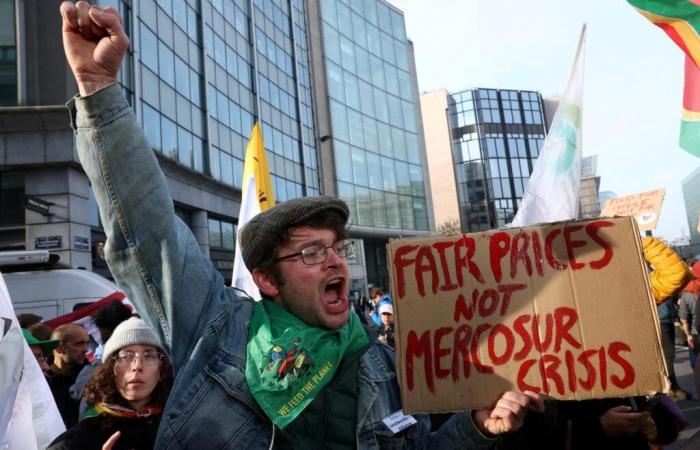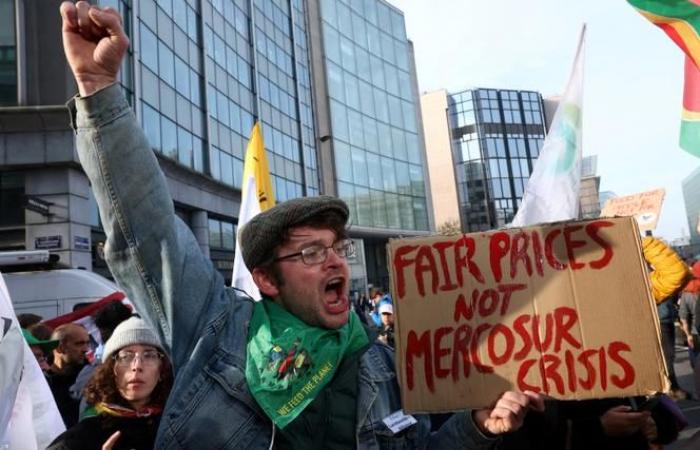Farmers who threaten to demonstrate throughout France, a French Prime Minister, Michel Barnier, who comes to plead his cause in Brussels: the prospect of an imminent signing of the trade agreement between the European Union (EU) and Mercosur creates political turmoil in France and Europe.
What is this EU-Mercosur agreement?
This is a proposed free trade agreement between the EU and the countries of the “Mercado Comun del Sur” (Mercosur), a trading bloc which brings together Brazil, Argentina, Paraguay, Uruguay and Bolivia.
If it sees the light of day, the agreement would be the most important free trade treaty concluded by the EU, both in terms of population concerned (780 million people) and trade volumes (between 40 billion and 45 billion euros of imports and exports).
The text aims to facilitate trade between Europe and South America by gradually eliminating almost all customs duties applied to trade between the two blocs. The EU hopes to boost the export of European products on which Mercosur countries apply high customs duties, such as cars, clothing or wine. The agreement also provides for a significant beef import quota, a recognition of nearly 400 protected geographical indications, and several other measures aimed at facilitating mutual access of European and South American companies to public markets.
Following a long negotiation process begun in the early 2000s, the treaty was formally concluded on June 28, 2019. But the hesitations expressed by several countries concerned on both sides of the Atlantic prevented its official signing.
Read also | Understanding everything about the free trade agreement between the EU and Mercosur
Read later
The election of Brazilian President Lula in 2022 relaunched the issue: the European Commission and Mercosur then resumed their discussions to negotiate an annex text supposed to clarify the treaty and defuse the main criticisms.
Commission President Ursula von der Leyen now wants to reach a compromise before the end of the year. Two occasions could lend themselves to the official signing of the treaty: the G20 meeting, which will be held from November 18 to 19 in Brazil, or the Mercosur summit, scheduled for December 6 to 8 in Uruguay.
Why are French farmers unhappy?
For several years, this project has raised serious concerns among farmers, who denounce the threat that the massive arrival of South American foodstuffs on the French market could pose. The agreement thus provides for the elimination of customs duties on the import of 45,000 tons of honey, 60,000 tonnes of rice or 180,000 tons of sugar.
The World
Support an editorial staff of 550 journalists
Unlimited access to all our content from €7.99/month for 1 year.
Subscribe
But the point which crystallizes the tensions concerns the quota of 99,000 tonnes of beef taxed at 7.5 %, to which are added 60,000 tonnes of another type of beef and 180,000 tonnes of poultry exempt from customs duty. Breeders denounce unfair competition against the more numerous large South American farms, subject to less demanding health and environmental standards, and where labor remuneration is lower.
One year after a vast European social movement of farmers, and while professional elections in the chambers of agriculture are planned for January 2025, French unions are mobilizing strongly against the EU-Mercosur agreement.
The National Federation of Farmers' Unions (FNSEA) and the Young Farmers (JA) are calling for actions in all departments from November 18: demonstrations will be organized Monday and Tuesday in front of the prefectures or on the roundabouts called “rounds -points of Europe”.
Read also | Article reserved for our subscribers Farmers: tension is rising, what the FNSEA is preparing from Monday
Read later
The Rural Coordination, the second agricultural union in the country, some of whose executives are close to the extreme right, promises “an agricultural revolt” starting November 19, with a “food freight blockage”.
The Confédération paysanne, the third union force defending a model of peasant agriculture, also opposed to free trade agreements, will not join the mobilization launched by the FNSEA-JA alliance but intends to mobilize ” with [ses] own modes of action ». The inter-professional associations of beef (Interbev), poultry (Anvol), cereals (Intercéales) and sugar (AIBS) also expressed their support for the mobilization.
Why is the French political class opposed to the agreement?
In France, hostility to this agreement transcends partisan divisions. More than 600 parliamentarians from diverse political backgrounds recently expressed their opposition in a forum at Mondeconsidering that the text does not respect “the democratic, economic, environmental and social criteria set by the National Assembly and the Senate”. A unanimity that we find in civil society, where the EU-Mercosur agreement brings together against it an unprecedented front of farmers, ecologists and detractors of free trade.
In 2020, an expert commission led by environmental economist Stefan Ambec, charged by the government with assessing the potential effects of the treaty, had already concluded that the agreement “represent[ait] a missed opportunity for the EU to use its negotiating power to obtain solid guarantees meeting the environmental, health, and more generally societal expectations of its fellow citizens”. He cited, for example, the risks of deforestation in Mercosur countries, which could be accelerated by 5% per year during the six years following ratification, due to the expected increase in beef production.
A recent audit by the European Commission, published in October, reinforced the health fears of opponents. It concludes that Brazil, the world's largest beef exporter, cannot guarantee that the red meat it exports to the EU has not been doped with estradiol 17-β, a growth hormone banned in Europe for decades but widely used in Brazil.
Although he had initially defended the agreement, Emmanuel Macron quickly changed his mind, presenting his change of heart as a measure of retaliation for the “anti-climate” policy of Jair Bolsonaro, then president of Brazil. Even though the latter has left power, Mr. Macron remains in his position today: in February, he welcomed – wrongly, moreover – that the negotiations had been stopped.
Also read (2019): Understanding Emmanuel Macron's change of heart on the EU-Mercosur agreement
Read later
informed Ursula von der Leyen of her opposition to the agreement, denouncing, on November 13, “the disastrous impact it would have on entire sectors, particularly agriculture and livestock”.
Although it rejects the project “as is”, the executive couple nevertheless remains open to a revised version. The government is therefore calling on the European Commission to renegotiate the text more thoroughly, in particular to integrate “mirror clauses”, which would impose identical standards on products traded between the two blocs.
The French government also defends the introduction of binding measures in favor of environmental protection, to make the treaty compatible with the objectives of the Paris climate agreement. So many requests that the European Commission does not seem ready to accept today.
What are the chances that the deal will go through?
The possibility of signing the EU-Mercosur agreement by the end of the year depends on the balance of power between the European Commission and the member states. But even once signed, the treaty will still need to be duly ratified by the EU before entering into force.
However, the presence in the agreement of non-strictly commercial provisions, encroaching on the competences of the Member States, would impose an “XXL” ratification procedure, which would require the unanimous green light of the Twenty-Seven, then the approval of the European Parliament and of all the national parliaments of the member countries. France would therefore have the possibility of vetoing.
To get around this difficulty, the European Commission is tempted to cut the agreement in two, by separating the cooperation aspect, which could be sacrificed, from the commercial aspect, which would then fall under the exclusive competence of the EU: its ratification would not require when a qualified majority vote (at least fifteen countries, representing 65% of the European population), depriving Paris of its right of veto.
Read also | Article reserved for our subscribers Free trade: in Brazil, the EU-Mercosur agreement no longer arouses as much enthusiasm
Read later
In this scenario, France would therefore have to, to block the agreement, bring together a blocking minority, by rallying at least four member states representing more than 35% of the European population. However, Paris remains generally isolated for the moment. Because even if Poland, Austria, the Netherlands and Ireland have regularly expressed their concerns about the agreement, their weight would not be sufficient to prevent the vote.
On the other hand, heavyweights like Germany and Spain are pushing the European Commission to finalize the agreement by the end of the year, in the hope of reviving European growth. Italy and Portugal also support this idea. Berlin sees in Mercosur particular new opportunities for its automobile manufacturers. By moving closer to this area of the world rich in lithium, copper, iron or cobalt, Europe is also seeking to secure its supply of raw materials necessary for the success of its ecological transition.







